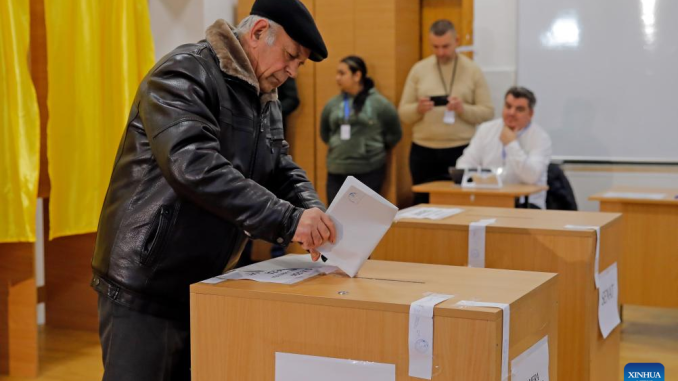

Exposed!! Popular Abuja doctor revealed how men can naturally and permanently cure poor erection, quick ejaculation, small and shameful manhood without side effects. Even if you are hypertensive or diabetic . Stop the use of hard drugs for sex!! It kills!
Romanians return to the polls today for a do-over presidential election, six months after a chaotic and controversial first round ended in annulment, accusations of fraud, and international tension.
The initial vote on November 24, 2024, produced a shock result when radical outsider Calin Georgescu—known for his mystical rhetoric and nationalist bent—emerged first. That result was later thrown out by Romania’s Constitutional Court following allegations of campaign fraud and Russian interference. The fallout was swift and far-reaching, including a sharp rebuke in February from U.S. Vice President JD Vance, who accused Bucharest of undermining democratic norms.
Despite the backlash, Georgescu has been barred from contesting today’s rerun, setting the stage for a dramatic race between ideologically divided candidates.
How To Overcome Quick Erection And Have A Big Cucumber And Very Strong Also Last For More Than 1 Hour [This Product Will Help You]

At the forefront is George Simion, leader of the far-right Alliance for the Union of Romanians (AUR), who has surged in popularity with a campaign built on nationalism, social conservatism, and public anger over Romania’s support for Ukraine. Facing him are three centrist contenders: Nicusor Dan, the technocratic mayor of Bucharest; Crin Antonescu, a liberal veteran representing the governing Social-Democrat and National Liberal coalition; and Elena Lasconi, an independent and former television journalist with grassroots appeal.
Seven other candidates round out the ballot. If no one secures over 50% of the vote—a likely outcome—a run-off will be held on May 18.
“This election is not about one candidate or another, but about every Romanian who has been lied to, ignored, humiliated, and still has the strength to believe and defend our identity and rights,” Simion posted on X on Friday.
Though Romanian opinion polls are notoriously unreliable, recent indicators suggest Simion may lead today’s vote. Analysts predict a tight run-off battle between him and either Dan or Antonescu, with Elena Lasconi a potential wild card.
The implications stretch far beyond Romania’s borders. As a NATO and EU member with key military infrastructure—including a U.S. missile defense base at Deveselu and multiple NATO airbases—Romania is a vital link in the West’s strategic posture in Eastern Europe.
The country plays a pivotal role in supporting Ukraine, facilitating grain exports through the Black Sea and training Ukrainian F-16 pilots. But that support hangs in the balance. A Simion presidency could mark a dramatic pivot away from pro-Western policies.
“Forget about any more help to Ukraine if Simion becomes president,” warned George Scutaru, a security analyst at the New Strategy Center. While the president’s role is officially ceremonial, their influence over the National Security Council gives them the power to shape—or block—major defense decisions.
Public resentment over Romanian financial aid for Ukrainian refugees has fueled Simion’s rise, though he denies being pro-Russian. His nationalist rhetoric has nevertheless unsettled leaders in Washington, Kyiv, and Brussels. Just days ago, the U.S. abruptly suspended negotiations on a visa-waiver program, signaling growing unease.
Back in Bucharest, the political drama contrasts sharply with the serenity at Cotroceni Palace, the presidential residence. Under interim President Ilie Bolojan, the palace and its gardens were opened to the public—a symbolic gesture of transparency and connection.
“I can’t really imagine Simion in here…” said Ionut, a satirical writer visiting the palace. He voted for Simion in November out of frustration with Romania’s stalled bid to join the EU’s Schengen zone. But with Romania finally granted land-border access in January and President Klaus Iohannis stepping down, “Romanians are less angry now,” he said, noting he’s leaning toward Nicusor Dan.
Others, like Ana, a young management consultant, are firmly behind Dan. “I want to vote for both continuity and change,” she explained. “Continuity in Romania’s relationship with Europe, but change in how politics is done.”
Meanwhile, Romania’s powerful diaspora—over a million registered voters—could prove decisive. Many cast their ballots early in countries like Spain, Italy, Germany, and the UK. Their preferences are absent from domestic polls, making today’s result even harder to predict.
What is clear is that Romania’s future—its global alliances, regional stability, and political identity—hangs in the balance.
